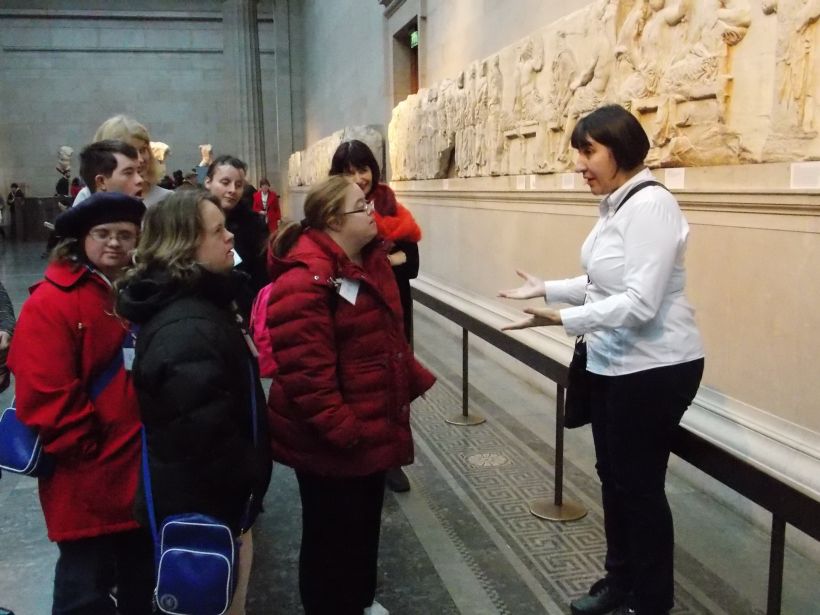First Qualified Tourist Guides in Europe Certified as "T-Guides" by FEG and ENAT
Share on social media
The first two professional tourist guides have been certified as "T-Guides" by FEG (European Federation of Tourist Guide Associations) and ENAT (European Network for Accessible Tourism) for guiding people with learning difficulties.
 Guiding visitors with learning difficulties. T-Guide training at the British Museum (Photo: FEG).
Guiding visitors with learning difficulties. T-Guide training at the British Museum (Photo: FEG).
We are proud to announce that the first two professional tourist guides have been certified as "T-Guides" by FEG (European Federation of Tourist Guide Associations) and ENAT (European Network for Accessible Tourism) for guiding visitors with learning difficulties.*
This is the final outcome of an EU funded Leonardo project, with FEG at its heart, to develop a CPD (continuing professional development) course for qualified tourist guides.
The T-Guide certificate holders areare:
- Themis Halvantzi-Stringer, London, UK (languages: English, Greek)
- Lisa Zeiler, Vienna, Austria (languages: German, English)
More T-GUIDES to be certified across Europe
T-Guide is a certification from FEG (European Federation of Tourist Guide Associations) and ENAT (European Network for Accessible Tourism) for guiding visitors with learning difficulties*. This is the final outcome of an EU funded Leonardo project, with FEG and ENAT participation, to develop a CPD (continuing professional development) course for qualified tourist guides.
The aim of T-Guide training is to enhance the skill set of qualified tourist guides, helping them to guide this growing client base competently and sensitively.
T-Guide Training Requirements
To achieve the certificate, tourist guides need to complete 4 stages:
- Online learning in modules each with a final assessment,
- A further written assessment requiring consolidation of the of the knowledge gained in the initial modules,
- Attend a one day interactive course and
- Within 6 months of the course set up and conduct a real tour with a group of people with learning difficulties and then provide client feedback and self-evaluation in a portfolio of evidence.
The intensive one-day course involves practising the use of ETUL (easy to understand language), improving understanding of the functional and social aspects of disabilities and of the relevant national and EU legislation.
Tourist guides are required to participate in exercises on shared understanding of learning difficulties, develop access statements and accessible/inclusive tourism through universal design. They must develop and demonstrate refinements in communication techniques and tour planning skills.
Having completed all four stages and achiving the T-Guide Certificate, the Tourist Guide's name and area of qualification will be publicised on the FEG and ENAT websites.
*if you are not familiar with the English expression "learning difficulties" you may recognize “intellectual disabilities” as corresponding more directly to the equivalent term in your language.
Related links
ENAT and FEG in partnership to improve tourist guiding to visitors with disabilites.
T-Guide Vocational Training Project Website
